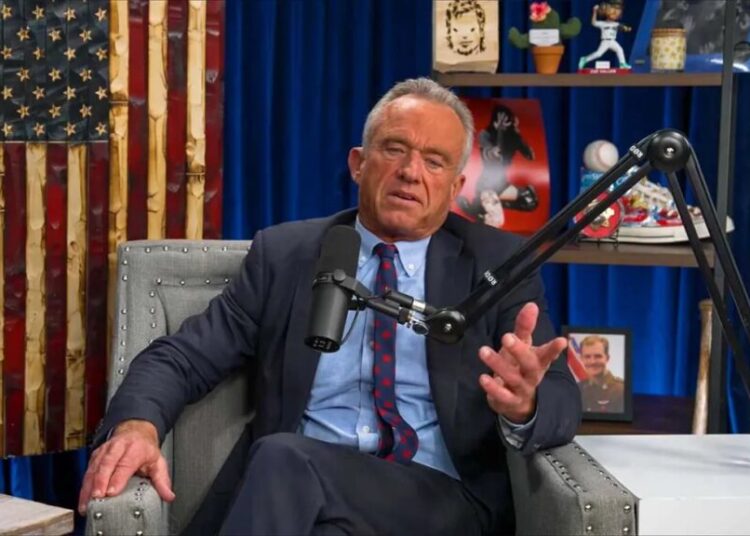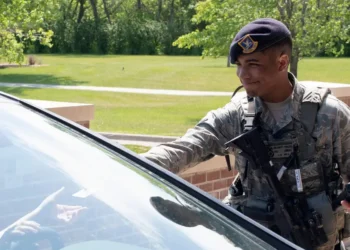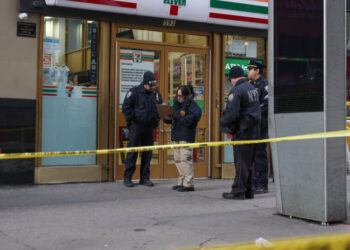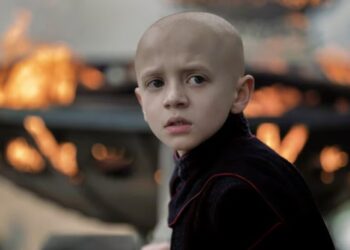He believed that a good leader should experience the worst of war alongside his soldiers.
So, at the age of 67, Andrei Demurenko, a Russian colonel, traveled from his command post in eastern Ukraine to see his most vulnerable frontline troops, crawling from trench to trench in the rain and sleeping in ankle-deep mud.
In the distance he could hear artillery cannons booming. Nearby, the city of Bakhmut was burning.
It was a world away from the neatly groomed grounds of Fort Leavenworth, Kan., where in 1992 he had arrived as a rising star, the first and only Russian commander ever chosen to study alongside American troops at the U.S. Army’s Command and General Staff College.
His time in the United States was supposed to be a small but important step toward ushering in a new era of possibility and peace after decades of the Cold War. “The end of history,” one scholar called it, when Washington and Moscow could finally coexist without enmity, and even cooperate.
Among the most hopeful were Mr. Demurenko and the American officers whom he came to see as lifelong friends.
But their noble aspirations were dashed. Even after his time in the United States, Colonel Demurenko still believed the Kremlin narrative that Ukrainian “Nazis,” backed by the United States and the West, were threatening Russia’s existence. He had absorbed these distortions so completely that by 2023 he had come out of retirement to wage war in Ukraine.
Later that year, Mr. Demurenko told the story of his life and war to a small Russian military journal. Officials at the U.S. Embassy in Moscow, the Army’s European headquarters and the Pentagon began reading and sharing it.
Mr. Demurenko’s journey from Kansas to the carnage in Ukraine seemed to encapsulate the arc of the U.S.-Russian relationship. It also stirred some big questions: How had things turned out so badly, and who was to blame?
Life at the front was “dirty, bad, savage,” Mr. Demurenko said in an interview with The New York Times. The temperature was close to freezing. Almost all of his men were sick, he recalled. Some, stricken with pneumonia or bronchitis, were coughing up blood.
After two days, pinned down by sniper fire and drones, he set off on foot for a car that would drive him back to his regimental headquarters. It was around 3 a.m. and pitch dark. He had turned 68 just hours earlier.
Without warning, a mortar exploded over his head, throwing him into a tree about 10 feet away. His troops dragged him into a trench. A medic injected him with a painkiller.
Mr. Demurenko, cold, muddy and wet, marched for about a mile before he made it to the waiting car. The blast had broken his nose, fractured bones in his skull and face, and caused bleeding in his brain.
His head was foggy. His eyes, he said, “became like those of the red devil.”
Eventually, word of Mr. Demurenko’s wounds reached his old friends from Fort Leavenworth, who had no idea that he had fought in Ukraine. They worried about his health and wondered why Mr. Demurenko, a man they remembered fondly, had volunteered to take part in a war that had caused so much destruction and slaughtered so many innocents.
How, they asked, had their friend become a battlefield foe?
Mr. Demurenko had been weighing a similar question: How would he explain his decision to go to war?
‘That’s Me’
A few weeks after the Soviet Union collapsed in December 1991, a letter landed on Mr. Demurenko’s desk.
The Defense Ministry was looking for a field commander who spoke English, had led a combat unit and was willing to move to the United States for one year.
Mr. Demurenko had just returned to Moscow from a job leading a 1,000-soldier battalion in the frigid Far East. He showed the letter to his commander. “You won’t believe it, but that’s me,” he said.
For Mr. Demurenko, an ambitious officer in the middle of his career, it was a chance to do something historic: study alongside American officers who had until recently been the enemy. He was also leaving a country in economic and social collapse.
He and his wife, Dina, sold almost everything they had of value, including Colonel Demurenko’s wedding ring, so she could go with him to Kansas.
The two arrived with almost nothing and were soon walking the aisles of a Walmart packed with pineapples and watermelon. There was a gun counter in which “even a grandmother” could purchase a pistol, Mr. Demurenko recalled.
“It was a shock,” he said.
To his classmates, Mr. Demurenko came off as larger than life. An avid fisherman, he caught sturgeon in the Missouri River, slit them open and served his classmates black caviar. “This river is full of it!” he told them. “Just don’t be lazy, go and catch it!”
One of his closest friends at the staff college was Rick McPeak, a major who had spent part of the 1980s in West Germany as an intelligence officer. Mr. Demurenko was stationed in East Germany around the same time preparing his men for war.
Now they were in the same 12-person study group. Mr. McPeak had just finished a master’s degree in Russian literature in preparation to teach at West Point. Most of their day was consumed with class discussions on U.S. military strategy and leadership.
In their free time, the two spent hours together talking about their lives, foreign policy and the great Russian writers.
A few weeks into the first semester, Mr. Demurenko mentioned to a classmate how much his wife missed their two young children who were living with their grandparents in Russia. His fellow students donated money to buy plane tickets, and soon Kirill and Katya were attending elementary school in Kansas.
The U.S. Army was at the height of its confidence and power, and Mr. McPeak recalled that a part of him wanted Mr. Demurenko to acknowledge America’s superiority. “The devil on my shoulder,” he said, expected his friend to admit that Russia “had lost” and that the 70 years of Soviet rule had been a mistake.
In his final weeks at the staff college, Mr. Demurenko wrote an article for a U.S. military journal in which he celebrated his classmates’ “sense of humor” and “high moral” character. The prospects for “closer cooperation and understanding” between the Russian and American militaries were bright, he concluded.
He returned to Moscow, and in 1995 deployed to Sarajevo as part of a United Nations force assembled to keep Bosnian Serbs and Muslims from killing each other.
The conflict, one of the first of the post-Cold War era, was an early sign of how far apart the United States and Russia remained.
In Sarajevo, Mr. Demurenko led an investigation that concluded that Russian-backed Serbs had been falsely accused of a bombing that killed dozens of Muslim civilians. U.S. officials dismissed his findings as propaganda.
Timothy L. Thomas, Mr. Demurenko’s former faculty sponsor in Kansas, interviewed him in 1996 about his Bosnia experience for a U.S. Army journal. They discussed Mr. Demurenko’s disputed investigation and his favorable impression of Gen. Ratko Mladic, a Serbian leader who the Americans said was a war criminal.
To Mr. Demurenko, General Mladic was a “brave commander” fighting in a brutal war. Mr. Thomas called that assessment “highly controversial.”
At the same time, Mr. Demurenko was losing the confidence of his commanders in Moscow. He was too close to the Americans, one officer told him. He would never become a general.
In 1997, Mr. Demurenko left the military at a moment of chaos and humiliation for his country. Factories were closing. The Russian military was struggling to pay troops. “It was banditry,” Mr. Demurenko recalled. “It was corruption. It was poverty.”
He worked for a shipyard, the Russian Railways and Johnson & Johnson, which was building a foothold in the new Russia. His boss at Johnson & Johnson, Tim Tigner, was a former U.S. Army officer.
Mr. Tigner moved back to the United States in the mid-2000s, but he never stopped thinking about Mr. Demurenko.
In 2014, Russia seized Crimea from Ukraine, widening its rift with the West. Mr. Tigner was at that moment writing his first spy novel, “Coercion,” which tells the story of a villainous Russian general who seeks to return his country to superpower status by stealing U.S. trade secrets.
Mr. Tigner modeled the novel’s hero, Andrey Demerko, on his former employee. Demerko is a combat veteran with “a profound sense of duty and honor” who sacrifices his life to save his country and his American friends.
The character was fictional. But it captured something essential about how most of Mr. Demurenko’s American friends saw him: He was one of the good guys.
A Soldier’s Duty
When Mr. Demurenko walked into a Moscow military enlistment office in 2023, hundreds of Russian soldiers were being killed every day in Ukraine. He had been retired from the military for more than 25 years.
A woman working in the office initially dismissed him as too old for war.
“I will do twice as many push-ups as you!” he recalled telling her.
She replied that he could join a frontline unit in the fight, if he could find a commander willing to take him.
A contact from Mr. Demurenko’s time in Sarajevo introduced him to “the Wolf,” a Bosnian Serb who had fought for the Wagner mercenary group in Syria and was now leading a brigade of volunteers. The Wolf needed a deputy.
Mr. Demurenko was driven by a sense of soldierly duty. “Tell me you’re a doctor and you see a bloodied person lying fallen on the road,” he said. “Are you going to ask about his ethnic background, his religion, his nationality? You will simply provide aid.”
He had accepted the Kremlin’s propaganda, which held that “Nazis,” backed by the West, were slitting the bellies of pregnant Russian women and encroaching on Moscow.
Like many aging men, he also craved relevance.
His family could not believe he was going to war at his age, even worse to a part of the front regularly referred to as a “meat grinder.” Dina cried and then handed him a religious icon for protection.
He lasted only six weeks before he was hit by the mortar and made his way to the car that carried him across the border and back to Moscow. There, Dina was waiting.
Last year, he told his story to Arms Export, a small Russian military journal that usually focuses on weapons systems. Mr. Demurenko talked about his time in Kansas, his work in Bosnia and the war in Ukraine.
His 600-soldier brigade, tasked with defending a flank near Bakhmut, was undermanned and poorly equipped with 1960s-era tanks, he said.
The biggest threat was enemy drones. His unit’s best asset was its men. “They’re not afraid,” Mr. Demurenko told his interviewer. “You just have to teach them, give them the order and they’ll go and break through.”
A team of U.S. Army officials in Germany, called the Troika, was among the first Americans to see Mr. Demurenko’s interview. The group writes about the Russian military in an email sent regularly to about 4,000 U.S. military leaders.
“There have been many strange stories to come out of the war in Ukraine, but perhaps none so unique as the story of Russian LTC Andrei Demurenko,” the Troika entry began.
To the Troika authors, Mr. Demurenko’s story revealed the deep suspicions baked into the U.S.-Russian relationship from the beginning. The mid-1990s, they wrote, were the “golden age” of U.S.-Russian military cooperation. But even during this era of “peacekeeping exercises” and “vodka shots,” Russian officials were purging their ranks “of officers they considered to be ‘in the enemy camp,’ i.e., in the American camp.”
They argued that Mr. Demurenko’s decision decades later to risk his life in an unjust and illegal war illustrated the unbridgeable nature of the divide.
Mr. Demurenko had seen the best of America and had been treated “badly” by Russia’s leaders, the Troika authors wrote. But he still remained “convinced of his country’s narrative, willing to fight and die for it,” they concluded.
Mr. McPeak, who retired as a brigadier general in 2015, had stayed in touch with Mr. Demurenko since their days in Kansas. He said he was “disappointed” when he learned his friend had volunteered to fight in Ukraine and wondered if Mr. Demurenko had felt compelled to act after watching a generation of young Russians die in a devastating war.
He thought back to one of their last in-person conversations in Moscow in 2018. Mr. Demurenko had described himself as “a patriot.”
“Is this what he meant?” Mr. McPeak wondered.
Today Mr. McPeak acknowledges that he had been naïve in 1992 to think that the Americans could convert Mr. Demurenko to their view.
But he rejected the Troika’s suggestion that Mr. Demurenko’s time in Kansas had been a waste. Mr. McPeak found hope in the curiosity and empathy that had compelled Mr. Demurenko to uproot his family and forge friendships with a former enemy. As long as that desire for mutual understanding remained, there was a chance for the United States and Russia to build a better relationship, he said.
In Moscow, Mr. Demurenko was reckoning with the aftermath of his war and the meaning of his story. He lives these days with a tremor in his right hand, a legacy of his injury in Ukraine, and lectures at the prestigious Higher School of Economics in Moscow.
He thinks often of the Russian troops who are still fighting and sometimes wishes he were still there with them. “The boys are dying every day,” he said. “That’s what’s painful. That’s what makes my heart bleed, because I saw it.”
As a young officer, Mr. Demurenko had been a skeptic of communism and the corruption it produced despite being a party member. “We saw that the newspapers wrote one thing, and life around us was another,” he said.
Today, he views President Vladimir V. Putin as a savior who restored Russia’s strength and is leading it in battle against an implacable enemy. The carnage that Mr. Demurenko witnessed at the front — broken bodies and bashed-in heads — reinforced his view.
He tried to see the war from his American friends’ perspective. Maybe “diplomacy” could have played a bigger role before the hostilities began, he acknowledged. Maybe Russia should not have struck first?
But he did not regret his decision to fight or doubt the war’s necessity, he said.
Nor had he given up on reconnecting with his American friends, even though the gulf between them had never been wider. This was why he had agreed to speak with The Times, he said.
“I firmly believed, and strangely enough still believe, that we have time ahead of us when we can jointly fight against all kinds of evil that exists on the planet,” he added. “We just need to live to see it.”
Julie Tate contributed research.
Greg Jaffe covers the Pentagon and the U.S. military for The Times.
The post He Saw the Best of America and Then Fought for Russia in Ukraine appeared first on New York Times.




